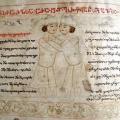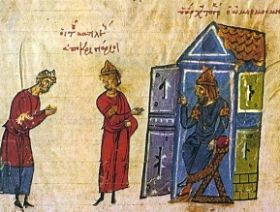320. People of the South: Byzantium and Islam
Intellectual exchange between Christians and Muslims, and the later flowering of Syriac literature including the philosopher Bar Hebraeus.
Themes:
• M. Heimgartner (trans.), Timotheos I., ostsyrischer Patriarch: Disputation mit dem Kalifen al-Mahdī (Leuven: 2011).
• S.T. Keating, Defending the “People of Truth” in the Early Islamic Period: The Christian Apologies of Abū Rā’iṭah (Leiden: 2006).
• S. Noble and A. Treiger, The Orthodox Church in the Arab World (700-1700): An Anthology of Sources (DeKalb: 2014).
• N.M. El Cheikh, Byzantium Viewed by the Arabs (Cambridge MA: 2004).
• H. Goddard, A History of Christian-Muslim Relations (Edinburgh: 2000).
• S.H. Griffith, “Disputes with Muslims in Syriac Christian Texts: From Patriarch John (d. 648) to Bar Hebraeus (d. 1286),” in F. Niewohner (ed.), Religionsgespräche im Mittelalter (Wiesbaden: 1992) 251-73.
• A.T. Khoury, Polémique byzantine contre l’Islam (VIIIe–XIIIe s.) (Leiden: 1972).
• J. Meyendorff, “Byzantine Views of Islam,” Dumbarton Oaks Papers 18 (1964), 113-32.
• D. Pratt et al. (eds), The Character of Christian-Muslim Encounter (Leiden: 2015).
• D.J. Sahas, Byzantium and Islam: Collected Studies on Byzantine-Muslim Encounters (Leiden: 2021).
• M. Tamcke (ed.), Christians and Muslims in Dialogue in the Islamic Orient of the Middle Ages (Beirut: 2007).
• H. Teule and C.F. Tauwinkl (eds), The Syriac Renaissance (Leuven: 2010).
• A. Trieger, “The Arabic Tradition,” in A. Casiday (ed.), The Orthodox Christian World (London: 2012), 89-104.
• M. Trizio, “A Neoplatonic Refutation of Islam from the Time of the Komneni,” in A. Speer and P. Steinkrüger (eds), Knotenpunkt Byzanz: Wissensformen und kulturelle Wechselbeziehungen (Berlin: 2012), 145-66.







Comments
Add new comment